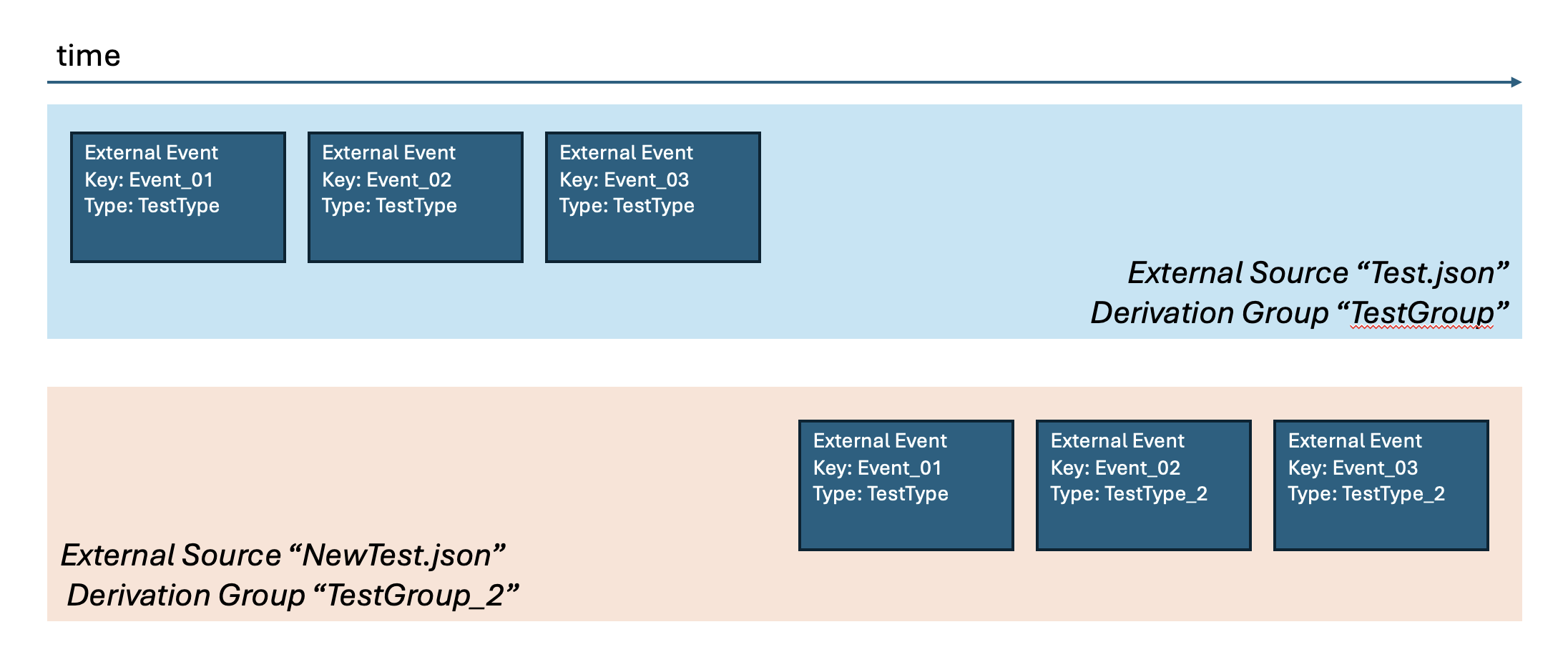Examples
This page details various examples of scheduling procedures to further illustrate how the aforementioned concepts can be used.
Scheduling a Recurring Activity
A recurrence goal specifies that a certain activity should occur repeatedly throughout the plan at some given interval. An example of this can be seen in the description of Activity Recurrence Goal.
We will replicate the second, more intricate goal. This places an activity of type GrowBanana every two hours,
unless an equivalent activity is already happening at the same time.
@SchedulingProcedure
public record ActivityRecurrenceGoal() implements Goal {
@Override
public void run(@NotNull final EditablePlan plan) {
// grab the current set of activities, and filter by those of type GrowBanana and duration 1 hour
var existingActivities = plan.directives("GrowBanana")
.filter(false, a -> a.inner.arguments.get("growingDuration").asInt().get() == 1)
.active().cache();
int count = 1;
for (final var time: plan.totalBounds().step(Duration.hours(2))) {
if (!existingActivities.sample(time)) {
plan.create(
// use NewDirective() to specify names/arguments for activities
new NewDirective(
// parameters
new AnyDirective(Map.of(
"growingDuration", BasicValueMappers.duration().serializeValue(Duration.of(1, Duration.HOUR)),
"quantity", SerializedValue.of(1)
)
),
// name
"GrowBanana" + count++,
// type
"GrowBanana",
// start time
new DirectiveStart.Absolute(time)
)
);
}
}
plan.commit();
}
}
Scheduling From Profiles
Next we'll show how to schedule from resource profile conditions, much like a Coexistence Goal
from the declarative scheduler. This goal places an activity 5 minutes after the end of each where /fruit is equal to 4.0.
@SchedulingProcedure
public record ResourceCoexistenceGoal() implements Goal {
@Override
public void run(@NotNull final EditablePlan plan) {
// Get the latest results, or simulate if they don't exist.
var simResults = plan.latestResults();
if (simResults == null) simResults = plan.simulate();
// access the resource
final var fruitResource = simResults.resource("/fruit", Numbers.deserializer());
for (final var interval: fruitResource.equalTo(4.0).highlightTrue()) {
// place the activity off of the window that the resource access created
plan.create(
"PeelBanana",
new DirectiveStart.Absolute(interval.start.plus(Duration.minutes(5))),
Map.of("peelDirection", SerializedValue.of("fromStem"))
);
}
plan.commit();
}
}
An implementation of a procedure that schedules based off of an external profile is almost exactly the same, except
the resource is queried using plan.resource("/my_resource") instead of simResults.resource("/my_resource").
In those cases, if you don't use any simulated resources, there's no need to get a sim results object.
Scheduling From Activities
We can also schedule relative to other activities, and place new activities that are anchored to them. This is a slightly
more complex example to show how to create activities to fix a problematic resource condition caused by other activities.
We look for BiteBanana activities, and check if those activities lower the /fruit resource below zero. If so,
we create a GrowBanana activity that replenishes the resource back up to zero. Lastly, we mock the effect the new
activity would have on the /fruit resource, rather than resimulating a potentially expensive mission model.
@SchedulingProcedure
public record ActivityCoexistenceGoal() implements Goal {
@Override
public void run(@NotNull final EditablePlan plan) {
// make sure we have up-to-date results to start with
final var simResults = plan.simulate();
var mockedFruit = simResults.resource("/fruit", Real.deserializer()).cache();
for (final var biteInstance: simResults.instances("BiteBanana")) {
final var biteInterval = biteInstance.getInterval();
final var fruitLevel = mockedFruit.sample(biteInterval.end);
if (fruitLevel < 0.0) {
final var growQuantity = Math.ceil(-fruitLevel);
plan.create(
"GrowBanana",
new DirectiveStart.Anchor(biteInstance.directiveId, Duration.HOUR.negate(), DirectiveStart.Anchor.AnchorPoint.Start),
Map.of(
"growingDuration", SerializedValue.of(Duration.HOUR.micros()),
"quantity", SerializedValue.of(growQuantity)
)
);
// mock the effect of new activity on fruit resource, so we don't need to resimulate
mockedFruit = mockedFruit.plus(Real.step(biteInterval.start, growQuantity));
}
}
plan.commit();
}
}
Scheduling From External Events
Consider this set of events:

Consider scheduling the Banananation activity BiteBanana off of these events.
This can mean a variety of different things, depending on the exact behavior we desire:
- schedule the activity coincident with all events
- schedule the activity coincident with events belonging to derivation group
"TestGroup" - schedule the activity coincident with events belonging to the second source
- schedule the activity based on events of type
"Test_Type" - schedule the activity based on events with the substring
"01"in their key.
We will just show one case - events belonging to the second source with the substring "01" in their key. The event query and subsequent call to plan.events() in this example creates an ExternalEvents timeline object - see Timelines: External Events for more information.
@SchedulingProcedure
public record ExternalEventsSourceQueryGoal() implements Goal {
@Override
public void run(@NotNull final EditablePlan plan) {
// extract events belonging to the second source
EventQuery eventQuery = new EventQuery(
null,
null,
new ExternalSource("NewTest.json", "TestGroup_2")
);
// look for events where key contains "01"
final var events = plan.events(eventQuery).filter(false, $ -> $.key.contains("01"));
for (final var e: events) {
plan.create(
"BiteBanana",
// place the directive such that it is coincident with the event's start
new DirectiveStart.Absolute(e.getInterval().start),
Map.of("biteSize", SerializedValue.of(1))
);
}
plan.commit();
}
}
After running it, we get the following result in AERIE:

As expected, there is a single activity, scheduled off of an Event_01 from the second source.